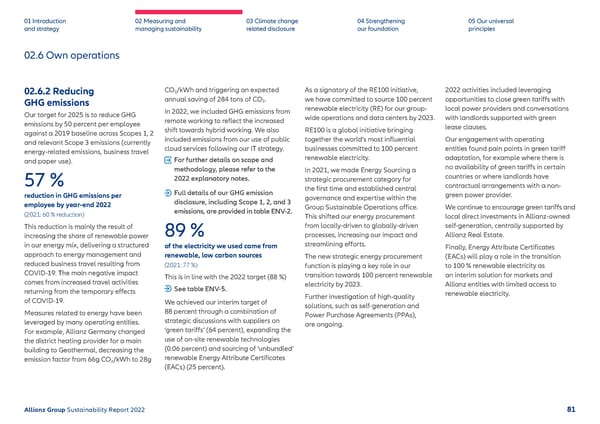01 Introduction and strategy 02 Measuring and managing sustainability 03 Climate change related disclosure 04 Strengthening our foundation 05 Our universal principles 02.6 Own operations 02.6.2 Reducing GHG emissions Our target for 2025 is to reduce GHG emissions by 50 percent per employee against a 2019 baseline across Scopes 1, 2 and relevant Scope 3 emissions (currently energy-related emissions, business travel and paper use). 57 % reduction in GHG emissions per employee by year-end 2022 (2021: 60 % reduction) This reduction is mainly the result of increasing the share of renewable power in our energy mix, delivering a structured approach to energy management and reduced business travel resulting from COVID-19. The main negative impact comes from increased travel activities returning from the temporary effects of COVID-19. Measures related to energy have been leveraged by many operating entities. For example, Allianz Germany changed the district heating provider for a main building to Geothermal, decreasing the emission factor from 66g CO 2 /kWh to 28g CO 2 /kWh and triggering an expected annual saving of 284 tons of CO 2 . In 2022, we included GHG emissions from remote working to reflect the increased shift towards hybrid working. We also included emissions from our use of public cloud services following our IT strategy. For further details on scope and methodology, please refer to the 2022 explanatory notes. Full details of our GHG emission disclosure, including Scope 1, 2, and 3 emissions, are provided in table ENV-2. 89 % of the electricity we used came from renewable, low carbon sources (2021: 77 %) This is in line with the 2022 target (88 %) See table ENV-5. We achieved our interim target of 88 p ercent through a combination of strategic discussions with suppliers on ‘green tariffs’ (64 percent), expanding the use of on-site renewable technologies (0.06 percent) and sourcing of ‘unbundled’ renewable Energy Attribute Certificates (EACs) (25 percent). As a signatory of the RE100 initiative, w e have committed to source 100 percent renewable electricity (RE) for our group- wide operations and data centers by 2023. RE100 is a global initiative bringing to gether the world’s most influential businesses committed to 100 percent renewable electricity. In 2021, we made Energy Sourcing a str ategic procurement category for the first time and established central governance and expertise within the Group Sustainable Operations office. This shifted our energy procurement from locally-driven to globally-driven processes, increasing our impact and streamlining efforts. The new strategic energy procurement function is playing a k ey role in our transition towards 100 percent renewable electricity by 2023. Further investigation of high-quality solutions, such as self -generation and Power Purchase Agreements (PPAs), are ongoing. 2022 activities included leveraging opp ortunities to close green tariffs with local power providers and conversations with landlords supported with green lease clauses. Our engagement with operating entities f ound pain points in green tariff adaptation, for example where there is no availability of green tariffs in certain countries or where landlords have contractual arrangements with a non- green power provider. We continue to encourage green tariffs and lo cal direct investments in Allianz-owned self-generation, centrally supported by Allianz Real Estate. Finally, Energy Attribute Certificates (EA Cs) will play a role in the transition to 100 % renewable electricity as an interim solution for markets and Allianz entities with limited access to renewable electricity. Allianz Group Sustainability Report 2022 81
 Sustainability Report 2022 | Allianz Page 81 Page 83
Sustainability Report 2022 | Allianz Page 81 Page 83